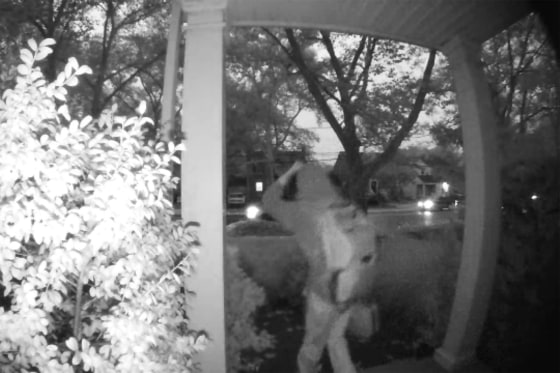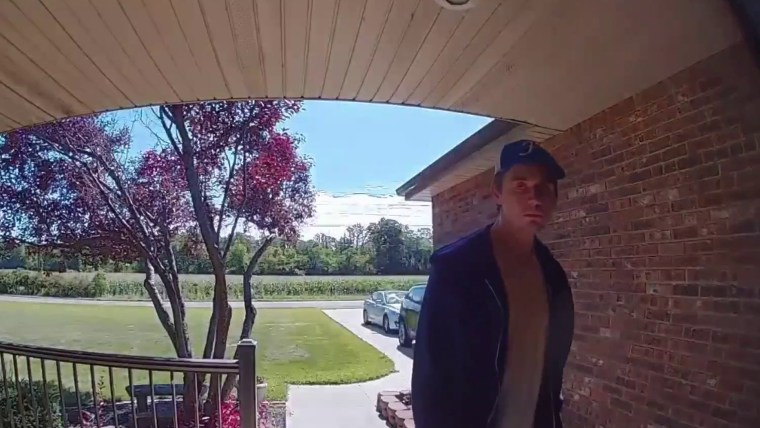Evan Greer
Evan Greer is the director of Fight for the Future, a nonprofit digital rights advocacy group.
Anna Bonesteel
Anna Bonesteel is the strategic response manager at Fight for the Future, a nonprofit digital rights advocacy group.

Amazon tries to gloss over concerns by marketing Ring cameras as fun and convenient. It even went so far as to launch an actual TV show, “Ring Nation,” on Amazon-owned MGM, featuring viral video from Ring cameras and other surveillance devices. It feels like, more than any other company, it has pushed to make this extreme form of private surveillance feel mainstream.
By 2021, Amazon had reportedly formed partnerships with around 2,000 police and fire departments, effectively giving police an easy push-button portal to request video from Ring camera owners in exchange for officers’ help marketing Amazon’s products. Meanwhile, Ring’s companion app, Neighbors, has been accused of amplifying racial biases. Neighbors users share “suspicious people” tips when they feel uncomfortable with people outside their homes; a 2019 Motherboard analysis found that the majority of Ring’s “suspicious people” reports target people of color.
Ring’s lax security practices in the past have allowed stalkers and hackers to break into people’s cameras, enabling a slew of horrifying incidents, like a grown man’s spying on an 8-year-old girl in her bedroom or another stranger’s yelling racist slurs at a couple through their hacked camera. Ring also seems to be making our neighborhoods more suspicious, turning neighbor against neighbor. Every additional camera sold by Ring Nation expands a system that makes racial profiling as easy as pressing a button. And we know that even unnecessary police interactions can turn tragic, especially for people of color.

Activists worry that this type of video could even be used to help harass or prosecute an abortion patient in a state that is trying to prevent people from seeking or providing care. Anti-abortionists have long used surveillance to intimidate and control people who can get pregnant.
This dystopian vision of a private police camera on every home would have been unthinkable a generation ago. But ever since Amazon’s “everything store” realized that its true power comes from knowing everything, it has been blanketing our homes, our neighborhoods, even our bodies in devices that constantly watch and listen to us.
Amazon knows when its drivers become distracted in their vans, and it may even discipline them. It knows when a competitor has a hot new item and undercuts it. It knows whether you’re sleeping well and where your coffee table is. And it is very good at winning; in 2021, Amazon sold as many doorbell cameras as its next four competitors combined, according to the business intelligence firm Strategy Analytics.
But in the end, this isn’t a problem that can be solved by individual consumer choices.
But in the end, this isn’t a problem that can be solved by individual consumer choices. We need policymakers to take action to protect all of us from the threat posed by sprawling surveillance empires.
The good news is that there is actually some bipartisan momentum toward cracking down on Big Tech surveillance capitalists’ monopoly and surveillance abuses. During the lame duck session after the election, Congress should pass the American Innovation and Choice Online Act, which would restrict Big Tech giants’ self-dealing and anti-competitive practices that help lay the foundation for Amazon’s surveillance operation. Lawmakers should also improve and pass privacy legislation to crack down on Amazon’s reckless vacuuming up of intimate data. The Biden administration should prioritize a fully staffed Federal Communications Commission, which has authority to address some harms from Amazon Ring drones and other Wi-Fi-connected devices. And the Federal Trade Commission should use its upcoming rulemaking to set real limits on the corporate surveillance that’s inciting violence in our neighborhoods.
Humanity is at a crossroads. We need to reject false promises of security and convenience in exchange for a loss of privacy. Something as simple as investing in more streetlights can reduce so-called quality-of-life crimes like package theft and car break-ins without aggravating racial profiling or supercharging oppressive surveillance. Real community safety comes from helping one another, not spying on one another.